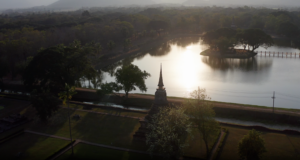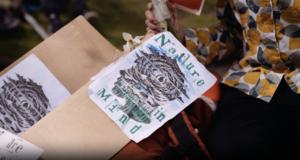In this film we explore Jewish perspectives on climate change through the lens of religious teachings and ethics. Judaism emphasises the concept of Tikkun Olam—the responsibility to repair and care for the world. The Jewish faith teaches that humans are stewards of God’s creation, tasked with preserving the environment for future generations. Jewish commitment to sustainability is an important value and the avoidance of waste (Bal Tashchit), and the moral obligation to act in ways that reduce harm to the planet is integral to the religion. Through these core values, the Jewish tradition calls for proactive efforts to combat climate change, emphasising both individual responsibility and collective action to protect the Earth for all living beings.
By linking spiritual values with environmental activism Climate Change: Judaism shows how faith can inspire a greener, more sustainable future.
Transcript
Climate Change: Judaism
Rabbi Mark Goldsmith: Jewish teachings start with the idea that humanity has a responsibility to nature and to the environment around us. Our foundation story has the idea of a human being being created and then being given responsibility for the animals, for the birds, for the trees, for all the nature around them. The idea being that they're not simply a user of nature, they're a steward of nature. What we mean is that I am responsible for something. It's a little bit like you're looking after somebody at school who's new doesn't know what to do. You steward them through the day, help them to know what to do. And it's a little bit like that with nature. We steward it, we look after it, we consider it to be our responsibility.
So our Jewish teachings then continue from there. One of them that I feel is incredibly strong is the idea of bal taschit. This is the concept that as a person, you shouldn't destroy things. And that could be destroying fruit trees. And in fact, when it comes up in the Torah, that's exactly what the idea of bal taschit is about. It's set at the time of war, when you would have thought that destroying the enemy's fruit trees would be a really good idea, because then what are they going to eat? But you're not meant to do that because those fruit trees are a legacy for all humanity. Another big Jewish concept is tikkun olam, which asks the question, what are we here for? Literally, what are we here for as human beings? And we have a concept in Judaism that we are partners with God in the repair of the world, that the world was not left absolutely perfect. Instead, there were parts of the world that don't function too well, and we know that we experience it in our lives, whether it be through illness, whether it be through degradation of the environment around us. So what's our job? Le tikkun from which comes the word tikkun, which means to repair olam, the world, the universe. So what can we do to do that? And we all know that some of the choices that we make, the choice perhaps to walk to school or walk to work or take the bus rather than put another car on the road with all its emissions, will help to repair the world. The choice to be an environmental scientist and come up with great discoveries as to how we can make a difference to the future, that is, tikkun olam. But honestly, it can be as little as this package. Now, I'm not going to throw it away into a regular bin. I'll take it home and put it in the recycling. That's a little bit of tikkun olum.
In the Torah. In the book of Leviticus, there is a wonderful idea. The idea is, number one, that every seven days you need to have a day of rest. But it's not just for you as a person. That's the Shabbat we call it, or the Sabbath. You also don't do new creative work. You don't use much of the Earth's resources. You reduce the impact you have on the world, and you do that by choice. But then came the idea that every seven years we should let the lands do the same. In the ancient land of Israel. Every seven years the land wouldn't be farmed for a year. Just whatever grew naturally would be picked. But we wouldn't exploit the land. And what that enabled the land to do was for the earth to begin to recover, for the soil to recover, to be more productive for the future, because it had had the chance to rest in the current state of Israel. There were quite a few farms which still do this practice called the Shmita year. You don't plow, you don't use all the intensive techniques you would normally use to get the most out of the land, and you just pick what naturally grows there, and that's that. And then the following year you go back to your regular techniques of agriculture or whatever you need. In Judaism, there is a key prayer that every Jew is meant to say twice a day. It's called the Shema, and for us it's a declaration of one God, but especially that that one God therefore means there's a unity in all of creation, that everything is one. Everything impacts on each other. And in the Shema, in its second paragraph, it says that if you don't behave well, then the rains may not come. And we used to think, well, it doesn't really work like that, does it? But now we know there's really some truth in that, the way that humanity. And I'm not just talking about Jews. I'm talking about all of us. Behave and treat. Our planet does make a difference to the weather that we experience, and we can make a change for the positive. So eco synagogue is part of eco Judaism, and that's the idea that Judaism in our day, has got to be really responsive to the crisis of climate change, to making a difference. We do it because we want to encourage all Jews to be better environmental citizens looking after our planet better.
We're about to reach the Jewish New Year, Rosh Hashanah, and on Rosh Hashanah there is a tradition called tashlich, which is where you go to a local water source and you throw bread on the water, and the bread is meant to represent your sins, the things you've done during the year that you really regret, that you want to change for the next year and behave better. So a brilliant organization called Repair the Sea came up with an idea to unite Jewish communities all around the world, and they call it Reverse Tashlich. Why not, instead of putting something into the water, we clean up the water. They call it repair the sea, because it doesn't matter if it's a tiny brook or it's a big river, or if it's the seaside itself. Everything flows into the sea and we know our seas are becoming more and more polluted. So what we're going to do as a synagogue is we're going to a local water source in a park, which we know eventually flows into a river, and that river flows into the sea. And we're going to clean it up. And through cleaning it up as we come to celebrate the Jewish New Year. We are trying to make the world that little bit better. Our Jewish New Year, Rosh Hashanah tradition, has the idea that it is ha-yom harat olam the day on which the earth was conceived as if it's the earth birthday. So what better birthday present to give to the world than to clean up a local river.
Volunteer 1: We're here today in Watling Park, cleaning up the Silk Stream, which feeds into the River Thames ultimately and part of Thames 21 initiative to, you know, just to clean up the waterways. But here today, representing eco Judaism as part of our core ethos, really, of being responsible communities and caring for our environment. We want to repair the world not just through good deeds, but through environmental action, to really get our community to think more about it.
Volunteer 2: So I feel this is a lot more meaningful than throwing breadcrumbs into the stream. It's so satisfying being able to clean up a park where I live is so important because it makes me feel home, and it also makes me appreciate the nature around me.
Volunteer 3: It feels so special to be involved in something like Reverse Tashlich today with the members of the community on such a beautiful day. It makes me feel that I'm doing something good not just for myself, not just for the members of my community, but for the wider community as well. Also, it focuses me on how much rubbish we as humans throw away, how much we pollute this beautiful, wonderful planet, and particularly this beautiful park.
Volunteer 1: It's really wonderful to be here today. It's just a lovely community activity, something to do with like minded people really feel like you're making a positive impact on the local environment and just it's very healing as an individual as well as actually for the place that we're cleaning up. So it was so great to be here today, and there were some young people in the park and they saw what we were doing, and they immediately wanted to help and took some of the litter tools and helped us clean the park.
Volunteer 3: It is really important for the Jewish tradition, for Jewish faith to care about the environment. There are lots of laws and commandments starting from the Torah by taking care of the world around us. My favourite one is the Midrash from the book of Ecclesiastes Rabbah, and that Midrash talks about God taking Adam by hand and taking him through the Garden of Eden. Beautiful place. And he shows him different beautiful trees, beautiful plants, and says, look how beautiful this place is. Look after it. Do not destroy it, because if you do, there will be no one else to repay it.








